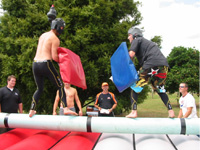
School galas, fetes and fairs are a great way to fundraise, bringing local communities together to create memorable experiences.
These Events are an integral part of New Zealand schools annual fundraising portfolios and are often essential for schools to financially survive.
Often major events have to be scheduled and timed right to co-ordinate with other local or large events, public holidays, sports and weather patterns to attract a good and profitable turnout.
Preparation
To make a successful event it is important to assemble a passionate team or committee and fit the right people for the right jobs by utilizing each individual’s strengths and skill set to then create roles or sub-teams with set achievable goals, responsibilities and timelines.
• Set an agreed goal or fixed common objective
• Gather the right team or committee and open communication to all
• Delegate roles and responsibilities with timelines
• Planning, budgeting, recording actions and time management
• Pre-event funding and sponsorship opportunities and rewards
• Site plan with accurate measurements and distribution of services
• Health and safety plan with council and OSH Permits for venue usage, food handling, alcohol and activity equipment plus safety regulations and responsibilities for each
• Advertising and signage – design look, source free advertising coverage, how to make and where to put signage
• Volunteer workers – local organizations parents, students and business associates
• Subcontractor contracts with duties and responsibilities
Method
• Atmosphere – A good quality PA System for announcements and broadcasting of music, bands, local singers, entertainers, dancers and cultural or sporting demonstrations
• Theme your event to add purpose and make it more fun for all, e.g. carnival, beach, cultural, medieval, western, military, film, fashion, cartoon, wine and food
• Entertainment – Ensure you have something suitable for all ages e.g. bouncy castles, rides, slides, interactive games, dunk tanks, bungy tramps, archery.
• Stall Holders – bric-a-brac, books, clothes, auctions, quick fire raffles, lucky dips, competitions.
• Food and Drink – cake stalls, sausage sizzles, toffee apples, candy floss, canned drinks, coffee stands and healthy alternatives.
• Amenities – Parking, toilets, rubbish bins, fencing, surfaces for high traffic throughfares, directional signage with areas maintained
• Shelter options for wet weather or hot sunny conditions
• Maintenance –electrician for power requirements and grounds men to maintain rubbish and traffic
• Security – Overnight if required, often the Police will assist at events
• Financial Centre with eftpos, change and tickets
• First Aid station for medical problems and lost children
The proof is in the eating
In order to learn from what worked and what could have been improved is essential. Rewarding the working committee in some way for all the hard work, to celebrate the event and create a plan for the next one while the ideas and excitement are still present.
One of the most important on-going benefits that can be gained for future events is to place a budget and time to produce post editorial advertising thanking sponsors and showing off what a great event it was.
The much-delayed English draft curriculum is now out for consultation, generating discussion from teachers.
Research from AUT demonstrates arts, culture and recreation have positive impacts on all aspects of…
How effective has the school phone ban been in achieving its aims? Researchers from the…
School camps and excursions deliver hands on learning experiences, helping to consolidate classroom learning.
Innovations in AV technologies present new opportunities to engage with students. We look at how…
A new report from the University of Auckland’s Our Voices Project asks young people what…
This website uses cookies.